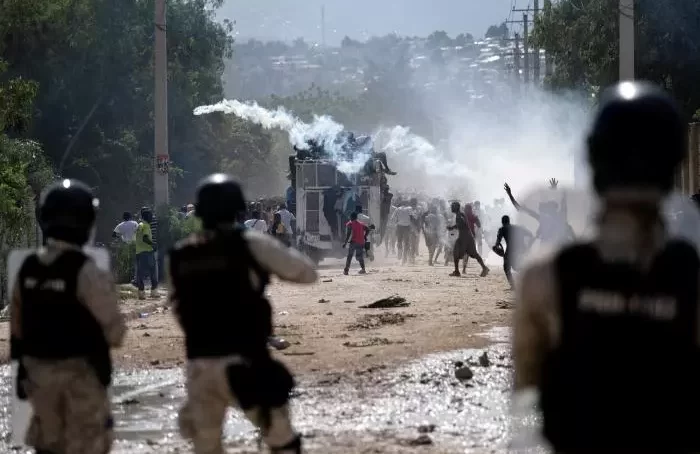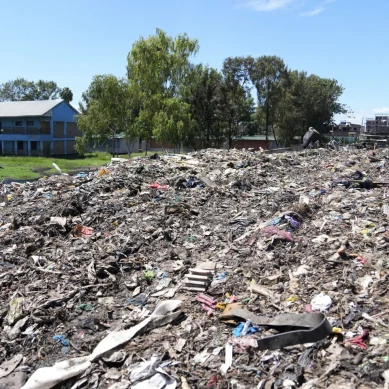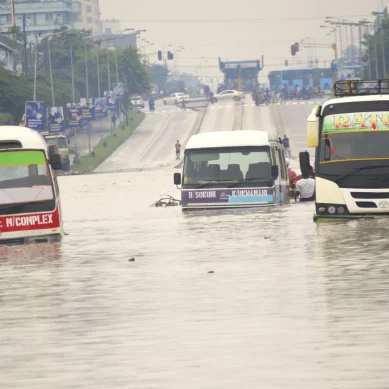
It was love at first sight for Madeline*, who first met Baptiste* at a church retreat in Haiti’s southern port town of Les Cayes in 2002. As infatuated teenagers, they eventually wedded and settled in the Caribbean country’s capital, Port-au-Prince.
With a growing family and unsteady work selling bottled sodas and food staples, the couple could only afford to rent in Cité Soleil, a seaside shantytown where armed groups have turned streets into battlegrounds.
The gang violence became so intense in July of this year that Madeline and Baptiste made the agonising choice to send their six children away to a shelter, for safety. Days later, the pair awoke in the middle of the night to find the neighbourhood in flames.
Grabbing what belongings they could, they fled toward Carrefour Lanmò, or “Crossroads of Death” – an intersection frequented by armed groups. They made it through, Madeline recalled, but an armed gang stopped them afterwards and dragged them onto a sidestreet.
Baptiste was pushed to the ground and beaten before a tyre was thrown around his neck and he was set on fire. His last words were: “Can’t you see that we are poor?”
Madeline, meanwhile, was raped by more than a dozen gang members. After they were done, she was told to run, forcing her to abandon Baptiste’s body.
“I was never a victim until then,” Madeline, 35, explained as she recounted the July events in September, shortly after being treated for a sexually transmitted disease she contracted during the gang rape.
Haitian women and children are not just being caught up in the country’s spiralling gang wars – they are increasingly being targeted for rapes, torture, kidnappings, and killings by the 200 armed groups that now control 60 per cent of the capital. On top of the daily struggle to survive, many are being left with trauma or injuries from attacks. Some, like Madeline, have also been left to fend for their families on their own.
Their plight has been compounded by a lack of safe shelters or refuge. More than 96,000 people have been displaced by the gang violence, but neither the Haitian government nor the international community have mandated formal displacement sites – centres set up during previous bouts of instability or disasters.
Dozens of women and girls have been raped at some of the 33 makeshift displacement camps, according to the Haiti-based Bureau des Avocats Internationaux (BAI), a legal group trying to assist some of the women who have been attacked.
As part of our ongoing Haiti coverage – and in an effort to gather data to better understand the extent of the problem – reporters spoke to more than a dozen victims, as well as aid workers, civil society groups, rights groups and government officials who said they are struggling to keep up with the unprecedented surge in cases.
Getting official numbers on sexual or gender-based violence in Haiti has never been easy, but the recent gang violence has compounded the problem. Women are often too afraid to report it, and many traditional reporting points such as hospitals, women’s centres and police stations have now shut because of the violence.
Médecins Sans Frontières (MSF), which still operates the Pran Men’m clinic in the capital, reports that recorded some 32 cases of rape or other gender-based violence in just two days in September.
“Speaking about 10 cases means there are 1,000 unreported; speaking about 100 means that there are 10,000,” said Lara Chlela, a focal point for the prevention of sexual exploitation and abuse with UNICEF.
Before gang violence took root, MSF would see between three and four patients a day who reported such abuse, according to Honorine Uwaringenz, the medical charity’s team leader at the Pran Men’m clinic. On average, 130 victims of gender-based violence are now being seen each month. Of those, 100 are rape victims.
Even armed female police officers have been targeted in attacks. On April 7, 2021, Guerline Joseph was kidnapped and tortured for three days, according to a report from the Institute for Justice and Democracy in Haiti (IJDH).
Armed groups have proliferated since the assassination of President Jovenel Moïse in July 2021 and, despite the rampant violence, a political solution has yet to materialise. Haiti’s de facto leader, Ariel Henry, has called for foreign troops to intervene, but nearly 100 civil society groups want a “Haitian-led solution” and oppose a foreign intervention.
Some government officials have also been accused of ties to gang members. The United States recently sanctioned two Haitian senators for their ties to gangs, and the involvement of armed groups in the illicit drug trade.
In the same wave of violence that drove Madeline and Baptiste from their home in July, Nathalie* – then six months pregnant and already a mother of four – said she was raped by armed men as she returned from searching for purified water near Deyè Mi, a crossing between two rival gangs in Port-au-Prince.
Since the attack, Nathalie has put three of her four children into an orphanage in Hinche, a town in central Haiti.
“It’s not that I don’t love my children,” Nathalie said, explaining that she feared her two boys and youngest daughter could be recruited into the gangs if they stayed. “I just couldn’t handle the situation anymore.”
Julienne did not report the rape, fearing retaliation from gang members.
In many of these marginalised neighbourhoods like Cité Soleil, young boys and girls are raised by guns and violence. With more than 60 per cent of the population unemployed and nearly 77 per cent living on less than $2 a day, much of the youth turn to gangs as a means of survival.
In reality, many members of armed groups have little agency over their own lives, driven into membership by the lack of economic opportunities, their authority reinforced by the neglect of these neighbourhoods by the Haitian state.
The wave of gang violence has prevented women from reporting such cases. MSF, for example, recorded roughly 980 cases of sexual violence in 2021 – a 23% drop from 1,275 cases in 2020, and one Uwaringenz attributes to women not being able to report cases to police or fearing retribution.
Armed groups outnumber police in some areas of the capital, and many police stations have been burned and looted for weapons.
“You are supposed to give those [rape] complaints to the gang leader in the area,” said Rosy Auguste Ducena, programmes manager at the National Human Rights Network (RNDDH), one of the groups collecting information on such cases.
In addition to the rampant violence in the capital, gangs have also established footholds in other densely populated urban areas, such as the northern city of Cap-Haïtien, where armed men killed a 70-year-old priest last year.
Gangs have also used sexual violence as a weapon against communities they accuse of collaborating against them, sometimes targeting women associated with rival groups for rapes or killings.
*Names have been changed for security reasons.
- The New Humanitarian report











